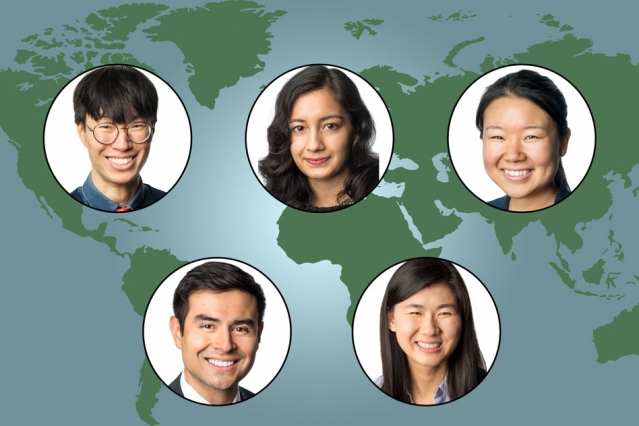Two from EECS win 2019 Paul and Daisy Soros Fellowships for New Americans

Clockwise from top left: Jonathan Zong (EECS), Indira Puri, Grace Zhang, Helen Zhou (EECS alumna), and Joseph Maalouf. Image courtesy of the Paul and Daisy Soros Fellowships.
Office of Distinguished Fellowships | EECS
A recent EECS alumna and a current EECS graduate student are among just 30 people nationwide to receive 2019 Paul and Daisy Soros Fellowships for New Americans.
Helen Zhou ’17, MEng ’18, and current PhD student Jonathan Zong join three other MIT-affiliated recipients of the fellowships. Each will receive up to $90,000 to fund their doctoral educations.
Zhou was born in Winnipeg, Manitoba, after her parents left China to pursue studies in Canada. When she was 6, her family moved to Canton, Michigan. As an undergraduate, Zhou conducted machine learning research at the MIT Media Lab. She also completed internships at Google and Amazon Search (A9.com). As a master’s student, she joined the MIT Clinical Machine Learning group, where her thesis on predicting antibiotic resistance from electronic medical records informed her current research interests.
Now a PhD student at Carnegie Mellon University, Zhou is exploring problems at the intersection of machine learning and health care, such as personalization, interpretability for human-in-the-loop learning, and synthesizing heterogeneous data from multiple modalities. Throughout her academic career, she hopes to develop methods that will allow scientists to continually shine new light on aspects of health care and medicine that are not well understood.
Zong was born in Houston, Texas, after his parents emigrated from China to pursue graduate school. He completed his undergraduate education at Princeton University in the computer science and visual arts departments. His computer science thesis investigated empirical methods for studying internet research ethics, while his visual arts thesis was an exhibition exploring how his discomfort with authority and power — especially his own — shapes his identity. At Princeton, Zong created research-based visual art that influenced discussions about technology in The New York Times and exhibited at the Centre National du Graphisme in Chaumont, France. In addition to his PhD studies, he serves as a graduate researcher at MIT’s Computer Science and Artificial Intelligence Laboratory (CSAIL). He is interested in visual interfaces that help people comprehend how technology governs human behavior. His goal is to serve the public interest by producing research that critically examines technologically mediated social relations. He has interned as a software engineer and graphic designer at companies including Coursera, Square, Linked by Air, and Google.
The other three MIT recipients include Joseph Maalouf, a PhD student in chemical engineering, Indira Purl, a PhD candidate in economics, and Grace H. Zhang ’17, a doctoral student in physics at Harvard University. In the past nine years, 34 MIT students and alumni have been awarded this fellowship.
The P.D. Soros Fellowships are open to all American immigrants and children of immigrants, including DACA recipients, refugees, and asylum seekers. The newest fellows were selected from a pool of 1,767 applications based on their potential to make significant contributions to U.S. society, culture, or their academic fields. Founded by Hungarian immigrants Daisy M. Soros and her late husband Paul Soros (1926-2013), the program honors continuing generations of immigrant contributions to the United States. “Paul and Daisy Soros Fellows are all passionate about giving back to the country and remind us of the very best version of America,” says Craig Harwood, director of the fellowship program.
MIT students interested in applying to the P.D. Soros Fellowship should contact Kim Benard, assistant dean of distinguished fellowships. The application for the 2020 fellowship is now open and the national deadline is Nov. 1.
Media Inquiries
Journalists seeking information about EECS, or interviews with EECS faculty members, should email eecs-communications@mit.edu.
Please note: The EECS Communications Office only handles media inquiries related to MIT’s Department of Electrical Engineering & Computer Science. Please visit other school, department, laboratory, or center websites to locate their dedicated media-relations teams.